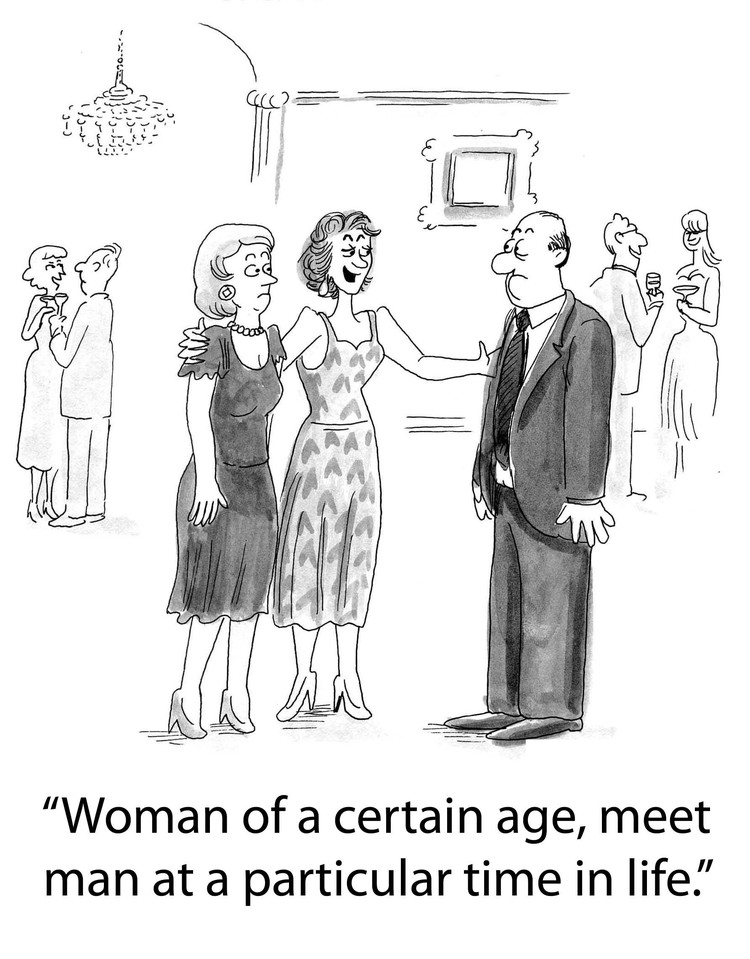A 2013 wedding announcement in the New York Times recorded the happy pairing of a couple who met through America’s Test Kitchen. He had founded the TV show and hired her 10 years earlier. He was 62; she was 37. The announcement ended with this paragraph:
Both say they have never really given much thought to the difference in their ages. “Others may have concerns, but we don’t,” he said. “I’m in love with someone who sees the same potential in the universe as I do.”
May they live long and happily.
The pairing of male boss and younger, female employee is a familiar pattern. I can see the announcement being greeted with resigned sighs by women like the one who wrote in to my blog Yo, Is This Ageist?.
I am a 37 year old woman and I am suffering through online dating. Not only do I have to face the insecurity of not being attractive or witty enough to engage a man’s interest (supported by my 0/22 success rate for replies from men I have emailed), now I have to face that I am considered too OLD for many men my age. The number of men in (their) late 30s, early 40s who list their age range for women as 24-33 is staggering. I never thought that at age 37 I would be viewed as an “older.”
This unhappy dater is the same age as the new bride, and if she read the wedding announcement, I bet she was concerned—not for the couple’s marital prospects but because it’s just another nail in the digital coffin of women like her who are seeking partners their own age. Perfectly reasonably.
It’s not the age difference that’s the problem. Yo, that would be ageist, and plenty of issues loom larger than age gaps when it comes to compatibility. It’s the convergence with sexism: the well-worn fact that men conventionally fish in a much larger pond than their female peers. It’s the rare man who’s willing to date someone even a few years older than he. My sister fared no better on Match.com when she made it a condition that any takers had to be willing to date someone their own age. (To be fair, her other conditions were that they live relatively near her in Cleveland and not have a boat in their picture. Maybe the boat jinxed her.)
In his book, The Magic of Middle-Aged Women, Daniel Evan Weiss sums up the sheer unfairness of the situation with this story from a friend. When she was in her late teens, her uncle tried to set her up with a guy in his late 20s. He wasn’t interested; she was too young. Encountering the same man online 32 years later, she dropped him a note. He still wasn’t interested. Now she was too old.
The ostensible justification is fertility, the proverbial ticking clock that benches women’s ovaries while the rest of them is still out on the playing field. Men are supposed to seek young babes with young eggs, and women, to bag high-status provider types, which is why bankers sometimes marry bimbos. Leaving aside the fact that the decline in fertility as women age has been way oversold, how about including fertility information in dating profiles? (Have you had children, do you want ‘em, do you want more of ‘em? Would they have to be biologically yours?) Would-be breeders, male or female, could request a fertility write-up along with recent STI (sexually transmitted infections) test results. But when’s the last time you heard a woman worrying that her date might be infertile? Or, for that matter, about the fact that birth defects and mental illnesses in children rise with the father’s age? Which is another reason the issue of women’s fertility is largely a red herring.
Weiss makes that point at the evolutionary level, writing that, “The survival of our species no longer depends on our ability to find a fit, fertile partner. Mankind is well established …. The future of humanity will be much brighter if men of power learn to choose for a mate Abigail Adams rather than the much cuter Eva Braun.” His book is a paean to the social, psychological and sexual charms of older women and an argument that more men of all ages should reap the benefits. “I have learned that I am much better off with veteran women, and so it is natural that they look good to me,” he writes.
The key word here is “learned,” because it’s going to be a long wait for natural selection to catch up to cultural imperatives. Weiss learned to think differently. What would it take for other men to follow suit in significant numbers?
I have a suggestion: dating sites should omit age and age range.
My friend—smart writer and online-dating expert Virginia Vitzhum—respectfully disagreed with this brilliant idea when I posted it on Facebook. “I think hiding your age feeds ageism, like ‘passing’ feeds racism,” she commented. “People want to know, and at some point, it’s weird not to tell the person you’re dating how old you are.” Virginia’s with my sister on “guys whose own age isn’t in their target range.” They’re not worth even considering.
Hiding or lying about your age is one thing, and it’s misguided in too many ways to count. But if all profiles on the site deliberately omit age and age range, considerations about that become moot. After they connect, people can ask via chat or in person. Age is not secret. It simply ceases to be a data point for first-order screening. Unless you’re into numerology, why make a person’s birth date the prime indicator of compatibility? It’s illegal to ask for age on a job application because it fosters discrimination. It has the same effect in the world of online matchmaking. Why should it be any more acceptable?



